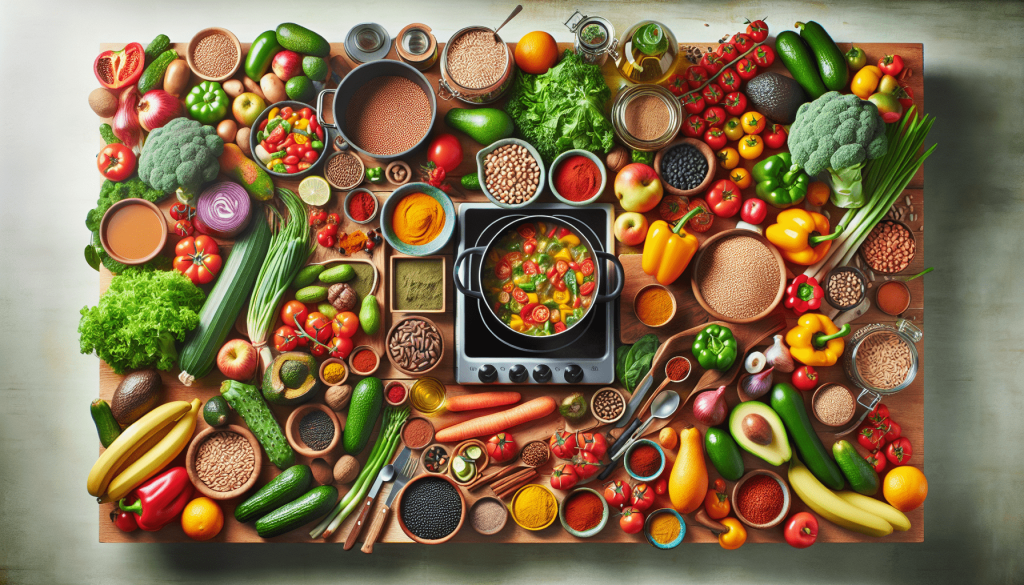If you’re looking to adopt a plant-based diet or simply incorporate more plant-based meals into your routine, you’re in for a treat! This article will provide you with the most popular cooking tips to help you navigate the world of plant-based cooking with ease and confidence. Whether you’re a seasoned chef or a beginner in the kitchen, these tips will offer valuable insights and practical advice to make your plant-based meals delicious, nutritious, and enjoyable for everyone. From creative ingredient swaps to flavourful seasonings and cooking techniques, you’ll discover a wealth of ideas to make your plant-based culinary adventures both exciting and satisfying. So grab your apron, sharpen those knives, and get ready to embark on a flavoursome journey!

Meal Planning
Meal planning is an essential part of a successful plant-based diet. By taking the time to create a weekly meal plan, you can ensure that you have nutritious and delicious meals ready to go throughout the week. Start by thinking about your favourite plant-based dishes and incorporate them into your plan. Consider the different types of cuisines you enjoy and try to include a variety of dishes to keep things interesting. By planning your meals in advance, you can also make better use of your time and ensure that you have all the necessary ingredients on hand.
Make a grocery list
Once you have your meal plan in place, it’s time to create a grocery list. By making a list before heading to the supermarket, you can avoid unnecessary purchases and ensure that you have all the ingredients you need for your plant-based meals. Take a look at your planned meals and jot down the ingredients required for each dish. Be sure to check your pantry and fridge to see if you already have any of the items on hand. By being organized and sticking to your list, you can save time and money at the grocery store.
Prep ingredients in advance
Prepping ingredients in advance is a great strategy for saving time and ensuring that you have healthy options readily available. Take some time each week to wash, chop, and store fruits and vegetables. This way, when it comes time to cook, you can simply grab what you need and get started. Prepping ingredients in advance also allows you to have healthy snacks on hand, making it easier to stick to your plant-based diet throughout the day.
Stocking Your Pantry
Stocking your pantry with the right ingredients is key to maintaining a plant-based diet. By having a variety of legumes and beans on hand, you can create delicious and protein-rich meals. Lentils, chickpeas, and black beans are all versatile options that can be used in a variety of dishes. Whole grains and cereals are also important pantry staples, as they provide essential nutrients and can be used as the base for many plant-based meals. Quinoa, brown rice, and oats are all great choices. Additionally, an array of herbs and spices will add flavour to your meals and make them more exciting.

Replacing Animal Products
If you’re transitioning to a plant-based diet, experimenting with plant-based substitutes can be a game-changer. There are numerous plant-based alternatives available for meat, dairy, and eggs that can make your transition easier and more enjoyable. Tofu and tempeh are popular meat substitutes that can be used in stir-fries, curries, and even burgers. These soy-based products are versatile and take on the flavors of the ingredients they are cooked with. If you’re a fan of dairy milk, try nut or seed-based milk as a substitute. They are creamy, nutritious, and come in a variety of flavors. Remember, it’s all about finding what works best for you.
Cooking Techniques
Mastering different cooking techniques can take your plant-based meals to the next level. Roasting vegetables is a simple yet effective way to enhance their flavors. Toss them in some olive oil, sprinkle with herbs and spices, and roast until they are crispy and caramelized. Sauteing with vegetable broth instead of oil is a healthy alternative that adds flavor without unnecessary fat. This method works well with onions, garlic, and leafy greens. Steaming is another great technique, as it helps to retain the nutrients in your vegetables. Plus, it’s quick and easy!
Flavor Enhancements
One of the most exciting aspects of plant-based cooking is the ability to experiment with a wide range of flavors. Herbs and spices are your best friends when it comes to adding depth and complexity to your dishes. Whether it’s a sprinkle of garlic powder, a pinch of paprika, or a handful of fresh herbs, these ingredients can transform a simple dish into a masterpiece. Don’t forget to explore umami-rich ingredients like nutritional yeast, which adds a cheesy and nutty flavor to your meals. Finally, citrus juices and zest can bring brightness and acidity to your dishes, balancing out the flavors.
Meal Prep Tips
Meal prep is a game-changer when it comes to maintaining a plant-based diet. By batch cooking and freezing meals, you can always have something healthy and delicious on hand, even on your busiest days. Prepare large batches of soups, stews, and casseroles, portion them out, and store them in the freezer for quick and easy meals at a later date. Another helpful tip is to pre-cut and store fruits and vegetables. This way, when you’re in a rush, you can grab prepped produce to snack on or add to your meals. Lastly, preparing dressings and sauces in advance can save you time and make your meals even more flavorful.
Plant-based Protein Sources
Protein is an important nutrient, and luckily, it can be easily obtained through plant-based sources. Legumes such as lentils, chickpeas, and black beans are excellent protein sources and can be used in a wide range of dishes. Experiment with different recipes, from lentil soups to chickpea curries, to find your favorites. Nuts and seeds are also protein powerhouses, providing healthy fats as well. Incorporate them into your meals through spreads, such as nut butters, or as toppings for salads and stir-fries. Soy products like tofu and tempeh are also excellent sources of protein and can be used in a variety of ways.
Balanced Nutrient Intake
Maintaining a balanced nutrient intake is essential when following a plant-based diet. While fruits and vegetables should make up a significant portion of your diet, it’s important to ensure variety to obtain all the necessary nutrients. Include a wide range of colorful fruits and vegetables to ensure you’re getting a good mix of vitamins and minerals. Calcium, iron, and omega-3 fatty acids are nutrients that can sometimes be lacking in a plant-based diet. Incorporate sources such as dark leafy greens, fortified plant-based milks, beans, and seeds to ensure you’re meeting your nutritional needs. Lastly, keep an eye on your vitamin B12 levels, as this nutrient is mainly found in animal products. Consider supplementation or fortified foods to meet your needs.
Texture and Mouthfeel
Texture and mouthfeel play a significant role in the enjoyment of a meal. To achieve meaty textures, consider using mushrooms or jackfruit as substitutes. Both options have a texture that can resemble meat and work well in dishes such as stir-fries, tacos, and sandwiches. Experimenting with different cooking methods can also help achieve a variety of textures. Whether it’s grilling, baking, or frying, each method can yield different results. Lastly, don’t forget to add crunchy elements like nuts or seeds to your dishes. Whether as toppings or ingredients, they add an extra dimension and challenge your palate.
Exploring International Cuisine
One of the most exciting aspects of following a plant-based diet is the opportunity to explore different cuisines from around the world. Each culture has its own unique plant-based dishes that are full of flavor and nutrition. Take the time to research and discover plant-based recipes from different cultures. Experiment with spices and flavors that are new to you. Learning new cooking techniques can also be a fun way to expand your culinary horizons. By exploring international cuisine, you can add variety to your meals and keep your taste buds satisfied.
In conclusion, following a plant-based diet can be a tasty and fulfilling way to nourish your body. By incorporating these cooking tips into your routine, you can create delicious and nutritious plant-based meals that will leave you feeling satisfied and energized. So, grab your apron, gather your ingredients, and get ready to embark on a culinary journey full of vibrant flavors and endless possibilities!
